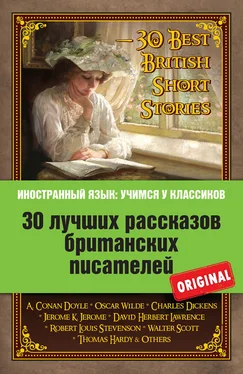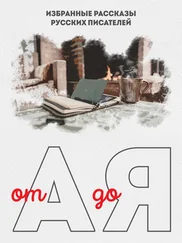‘Out through that window, three years ago to a day, her husband and her two young brothers went off for their day’s shooting. They never came back. In crossing the moor to their favourite snipe-shooting ground they were all three engulfed in a treacherous piece of bog. It had been that dreadful wet summer, you know, and places that were safe in other years gave way suddenly without warning. Their bodies were never recovered. That was the dreadful part of it.’ Here the child’s voice lost its self-possessed note and became falteringly human. ‘Poor aunt always thinks that they will come back some day, they and the little brown spaniel that was lost with them, and walk in at that window just as they used to do. That is why the window is kept open every evening till it is quite dusk. Poor dear aunt, she has often told me how they went out, her husband with his white waterproof coat over his arm, and Ronnie, her youngest brother, singing “Bertie, why do you bound?” as he always did to tease her, because she said it got on her nerves. Do you know, sometimes on still, quiet evenings like this, I almost get a creepy feeling that they will all walk in through that window–’
She broke off with a little shudder. It was a relief to Framton when the aunt bustled into the room with a whirl of apologies for being late in making her appearance.
‘I hope Vera has been amusing you?’ she said.
‘She has been very interesting,’ said Framton.
‘I hope you don’t mind the open window,’ said Mrs. Sappleton briskly; ‘my husband and brothers will be home directly from shooting, and they always come in this way. They’ve been out for snipe in the marshes to-day, so they’ll make a fine mess over my poor carpets. So like you men-folk, isn’t it?’
She rattled on cheerfully about the shooting and the scarcity of birds, and the prospects for duck in the winter. To Framton it was all purely horrible. He made a desperate but only partially successful effort to turn the talk on to a less ghastly topic; he was conscious that his hostess was giving him only a fragment of her attention, and her eyes were constantly straying past him to the open window and the lawn beyond. It was certainly an unfortunate coincidence that he should have paid his visit on this tragic anniversary.
‘The doctors agree in ordering me complete rest, an absence of mental excitement, and avoidance of anything in the nature of violent physical exercise,’ announced Framton, who laboured under the tolerably widespread delusion that total strangers and chance acquaintances are hungry for the least detail of one’s ailments and infirmities, their cause and cure. ‘On the matter of diet they are not so much in agreement,’ he continued.
‘No?’ said Mrs. Sappleton, in a voice which only replaced a yawn at the last moment. Then she suddenly brightened into alert attention – but not to what Framton was saying.
‘Here they are at last!’ she cried. ‘Just in time for tea, and don’t they look as if they were muddy up to the eyes!’
Framton shivered slightly and turned towards the niece with a look intended to convey sympathetic comprehension. The child was staring out through the open window with dazed horror in her eyes. In a chill shock of nameless fear Framton swung round in his seat and looked in the same direction.
In the deepening twilight three figures were walking across the lawn towards the window; they all carried guns under their arms, and one of them was additionally burdened with a white coat hung over his shoulders. A tired brown spaniel kept close at their heels. Noiselessly they neared the house, and then a hoarse young voice chanted out of the dusk: ‘I said, Bertie, why do you bound?’
Framton grabbed wildly at his stick and hat; the hall-door, the gravel-drive, and the front gate were dimly-noted stages in his headlong retreat. A cyclist coming along the road had to run into the hedge to avoid an imminent collision.
‘Here we are, my dear,’ said the bearer of the white mackintosh, coming in through the window; ‘fairly muddy, but most of it’s dry. Who was that who bolted out as we came up?’
‘A most extraordinary man, a Mr. Nuttel,’ said Mrs. Sappleton; ‘could only talk about his illnesses, and dashed off without a word of good-bye or apology when you arrived. One would think he had seen a ghost.’
‘I expect it was the spaniel,’ said the niece calmly; ‘he told me he had a horror of dogs. He was once hunted into a cemetery somewhere on the banks of the Gangesby a pack of pariah dogs, and had to spend the night in a newly dug grave with the creatures snarling and grinning and foaming just above him. Enough to make anyone lose their nerve.’
Romance at short notice was her speciality.
Reginald on Christmas Presents
I wish it to be distinctly understood (said Reginald) that I don’t want a ‘George, Prince of Wales’ Prayer-book as a Christmas present. The fact cannot be too widely known.
There ought (he continued) to be technical education classes on the science of present-giving. No one seems to have the faintest notion of what anyone else wants, and the prevalent ideas on the subject are not creditable to a civilised community.
There is, for instance, the female relative in the country who ‘knows a tie is always useful,’ and sends you some spotted horror that you could only wear in secret or in Tottenham Court Road. It might have been useful had she kept it to tie up currant bushes with, when it would have served the double purpose of supporting the branches and frightening away the birds – for it is an admitted fact that the ordinary tomtit of commerce has a sounder æsthetic taste than the average female relative in the country.
Then there are aunts. They are always a difficult class to deal with in the matter of presents. The trouble is that one never catches them really young enough. By the time one has educated them to an appreciation of the fact that one does not wear red woollen mittens in the West End, they die, or quarrel with the family, or do something equally inconsiderate. That is why the supply of trained aunts is always so precarious.
There is my Aunt Agatha, par exemple , who sent me a pair of gloves last Christmas, and even got so far as to choose a kind that was being worn and had the correct number of buttons. But – they were nines ! I sent them to a boy whom I hated intimately: he didn’t wear them, of course, but he could have – that was where the bitterness of death came in. It was nearly as consoling as sending white flowers to his funeral. Of course I wrote and told my aunt that they were the one thing that had been wanting to make existence blossom like a rose; I am afraid she thought me frivolous – she comes from the North, where they live in the fear of Heaven and the Earl of Durham. (Reginald affects an exhaustive knowledge of things political, which furnishes an excellent excuse for not discussing them.) Aunts with a dash of foreign extraction in them are the most satisfactory in the way of understanding these things; but if you can’t choose your aunt, it is wisest in the long-run to choose the present and send her the bill.
Even friends of one’s own set, who might be expected to know better, have curious delusions on the subject. I am not collecting copies of the cheaper editions of Omar Khayyám. I gave the last four that I received to the lift-boy, and I like to think of him reading them, with Fitz Gerald’s notes, to his aged mother. Lift-boys always have aged mothers; shows such nice feeling on their part, I think.
Personally, I can’t see where the difficulty in choosing suitable presents lies. No boy who had brought himself up properly could fail to appreciate one of those decorative bottles of liqueurs that are so reverently staged in Morel’s window – and it wouldn’t in the least matter if one did get duplicates. And there would always be the supreme moment of dreadful uncertainty whether it was cr è me de menthe or Chartreuse – like the expectant thrill on seeing your partner’s hand turned up at bridge. People may say what they like about the decay of Christianity; the religious system that produced green Chartreuse can never really die.
Читать дальше
Конец ознакомительного отрывка
Купить книгу












